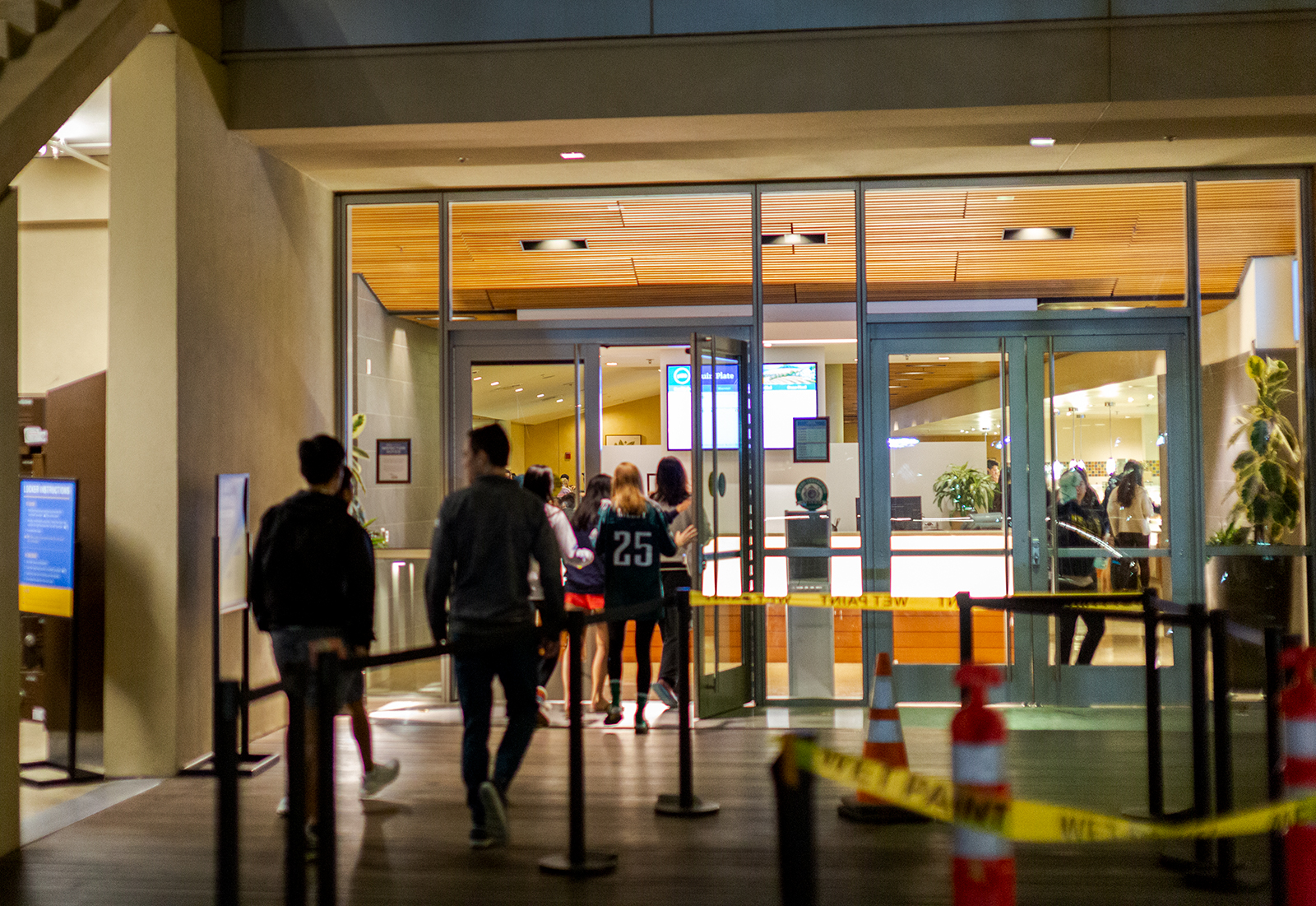UCLA Dining uses food waste audits to aid in sustainability mission, awareness

The UCLA Sustainability Committee, founded in 2004 to increase environmental sustainability on campus, has been auditing the food waste created by residential dining halls for the current and past academic years. Students turning in their dishes waited to have their leftover food weighed and recorded by volunteers during audits Nov. 18 and Nov. 20 at the De Neve and Feast at Reiber dining halls. (Daily Bruin file photo)
By Annie Wu
Dec. 2, 2019 1:11 a.m.
On a November day in Feast at Rieber, students bearing nearly empty plates to the dish drop-off to be washed instead waited their turn to have their leftover food weighed.
The event was part of UCLA Dining Services’ ongoing food waste audits in residential restaurants on the Hill.
This quarter, audits of dining hall food waste were held at De Neve on Nov. 18 and Feast on Nov. 20. Eight audits, two of each dining hall, were also conducted over the past academic year, said Erin Fabris, the sustainability manager for UCLA Housing & Hospitality Services.
During the audits, student volunteers weigh leftover food on dishes, and the data is then used to further improve sustainability on the Hill.
The audits were organized by the UCLA Sustainability Committee and UCLA Housing. Founded in 2004, UCLA Sustainability is a committee that is part of a wider campus initiative to engage the community in becoming more sustainable. It coordinates with UCLA Housing to hold programs like the dining hall audits.
UCLA Sustainability aims to audit each dining hall twice per academic year as part of its ongoing efforts to reduce food waste at the Hill’s residential restaurants, Fabris said.
“Data collected from the audits helps determine how much food waste is composted and provides metrics about how much food waste is decreasing, which can be correlated with awareness campaigns about food waste,” Fabris said.
She added audits are a great educational opportunity for students, who can learn how much food is being thrown away and how it impacts the environment.
Surveys conducted for the same research can also show which foods are more likely to be thrown away, which allows UCLA to change the menus accordingly if there is a particular food item that is being wasted more often, Fabris said.
“Audits found diners returned their dishes with an average 2.5 ounces of edible food per diner, the equivalent of two and a half slices of bread,” Fabris said. “That adds up to 218 pounds of food per meal that guests scrape off their plates and into the compost, an average of 2180 pounds per day.”
Some students said they volunteered to help out with the audits in order to learn more about sustainability on the Hill.
Laurel Thomas, a student volunteer at the Nov. 20 Feast audit and a first-year environmental science student, said these audits are important because they help students see the amount of waste they produce.
“We could have easily been in the kitchen weighing the food back there, but we did it in the dining hall so the students could understand the quantity of food waste being produced,” Thomas said. “It’s easy to think that your own waste doesn’t matter, but combined with everyone else, the waste is a huge amount.”
Another student who volunteered at the Feast audit, Ingrid Chen, a fifth-year environmental science student, also talked about the importance of audits.
“I personally think that food waste audits should be conducted more often so that students will be more aware of how much food they waste,” Chen said. “The final results should also be posted in the dining halls, not just emailed to volunteers.”
Chen added some people were annoyed with having to wait in line to have their waste audited.
UCLA Sustainability will continue to hold audits throughout the remainder of the year in order to gain more information about the waste being generated on the Hill and to ultimately decrease food waste, Fabris said.
“UCLA Dining conducted eight food waste audits across the (2018-2019) academic year and is on track to meet its annual goal of two audits per dining hall this year as well,” Fabris said.

